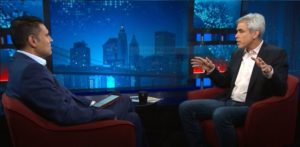[From Behavioral Scientist]
To Fight Polarization, Ask, “How Does That Policy Work?”
By Alex Chesterfield and Kate Coombs
(…)
Alex’s experience reflects an increasingly split United Kingdom and United States, where ideological and political polarization (defined as the division of attitudes, typically along a single dimension)— have evolved into a new “phenomenon of animosity,” according to political scientist Shanto Iyengar and colleagues. That phenomenon is affective polarization—when ordinary people “increasingly dislike and distrust those from the other party.” Research from 2010 shows, for instance, that nearly half of Republicans, and about one third of Democrats, said they would feel “somewhat or very unhappy” if their child married a member of the opposing party. This was around 5 percent in the 1960s.
(…)
In one U.S. study, when research asked participants of various political affiliations to explain how different policies, such as instituting a cap and trade system, would bring about specific outcomes, like reduced carbon emissions, they moderated their attitudes and reduced their donations to relevant advocacy groups. In contrast, the participants who simply provided a list of reasons that they supported a policy did not. These findings, researchers conclude, could imply a connection between polarized attitudes and overly simplistic mental models for how policies actually work.
(…)
Alex Chesterfield
Alex Chesterfield is a behavioral scientist working in financial services. She is an associate of the Depolarization Project, based in Stanford, California. Previously, she was an elected local government councillor in the U.K. and has an M.Sc. from UCL in cognitive and decision science.
Kate Coombs
Kate Coombs is a behavioural scientist working in financial services. She holds an MSc in Cognitive and Decision Sciences from University College London.”

